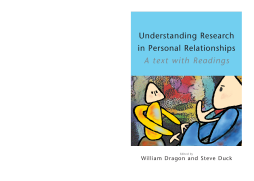
BOOK
Understanding Research in Personal Relationships : A Text with Readings
(2005)
Additional Information
Book Details
Abstract
'This book provides an extremely well written and informative introduction to the subject of media economics, characterized by clarity in the explanation of concepts or frameworks and by a balanced discussion for the respective positions in areas of debate' - Paul MacDonald, Roehampton Institute. Understanding Media Economics provides a clear, precise introduction to the key economic concepts and issues affecting the media. The book: explains the fundamental concepts relevant to the study of media economics; considers the key industrial questions facing the media industries today; relates economic theory to business practice; covers a wide range of media activity - advertising, television, film, print media, and new media; and looks at the impact of economics on public policy.
Table of Contents
| Section Title | Page | Action | Price |
|---|---|---|---|
| Prelims (Contents, List of boxes, figures and tables, About the authors, Foreword by Simon Maxwell, Preface, List of acronyms) | |||
| PART I: BACKGROUND AND THEORETICAL FRAMEWORK | |||
| 1. Research and policy in international development: introduction | |||
| Julius Court, Ingie Hovland, John Young | |||
| 2. Context, evidence, links: a conceptual framework for understanding research–policy processes | |||
| Emma Crewe, Ingie Hovland, John Young | |||
| PART II: CASE STUDIES | |||
| 3. The PRSP initiative: multilateral policy change and the role of research | |||
| Karin Christiansen, Ingie Hovland | |||
| 4. How the Sphere Project came into being: a case study of policy making in the humanitarian-aid sector and the relative influence of research | |||
| Margie Buchanan-Smith | |||
| 5. Animal healthcare in Kenya: the road to community-based animal health service delivery | |||
| John Young, Julius Kajume, Jacob Wanyama | |||
| 6. Sustainable livelihoods: a case study of the evolution of DFID policy | |||
| William Solesbury | |||
| PART III: SYNTHESIS AND CONCLUSION | |||
| 7. Crosscutting issues and implications: promoting more informed international development policy | |||
| Julius Court, Ingie Hovland, John Young | |||
| End Matter (Footnotes, Bibliography, Index) |
